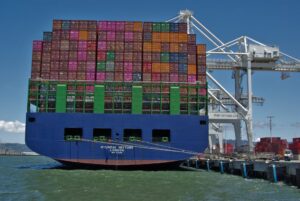APM Terminals (APMT) has launched two further APIs and increased the number of terminals providing real-time data at its hubs.
In a statement, the company said it believes that if other supply chain partners followed its lead, it could significantly improve the competitiveness of the catchment areas supported by its terminals.
APMT said it has already offered APIs to monitor vessel schedules and plan and monitor import and export containers since last year.
With the launch of an Empty Container Returns API earlier in March 2021, containers passing through APMT facilities can be followed in real-time throughout the complete terminal cycle.
APM Terminals Maasvlakte II in Rotterdam and SFCT in Miami have also started feeding the company’s APIs with real-time data this month, bringing the total number of terminals to 13, and plans to add further terminals throughout this year.
APIs enable customers’ own logistics or transport management tools to be fed with data from APM Terminals Terminal Operating System (TOS).
APIs are therefore only as effective as the data they transmit. Over recent years, APM Terminals has invested in technologies that have made TOS data increasingly accurate and even more ‘real time’, such as Radio-frequency identification (RFID), Optical Character Recognition (OCR), GPS based Position Detection Systems and 4G LTE networks.
With highly reliable data now automatically being fed into customers’ own transport management systems via APM Terminals’ APIs, customer supply chains become increasingly efficient.
Transfers between different modes of transport happen with minimum delay or interruptions due to data entry errors or missing paperwork.
This significantly improves a company’s competitiveness, with goods getting to customers faster, less time and fuel spent on transport, and improved reliability and predictability, which reduces waste and stock holding.
David Francis, Head of Digital Products at APM Terminals, said local economies could benefit significantly more if this type of technology was available for all supply chain modalities across a region or beyond.
“This would involve aggregating data not only from APM Terminals APIs, but from all transport modalities, into a single regional system, to provide complete end-to-end visibility.
“With APIs based on common industry-wide standards, they provide the perfect platform for this.
“Whilst this could potentially take decades to achieve at national or even international level, starting with the regional industrial area supported by a container terminal would be more manageable, as local governance or trade bodies can normally react more quickly.”









